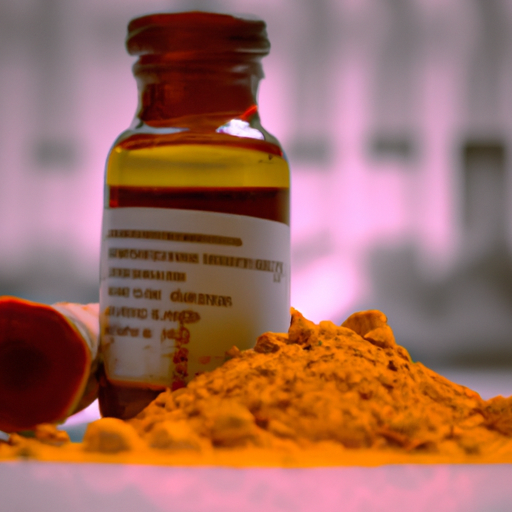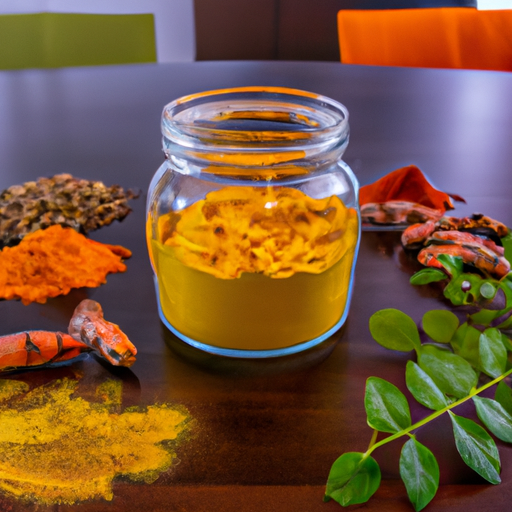As someone who regularly drinks turmeric tea, I became interested in its potential interactions with medications. Turmeric is a popular spice in Indian and Southeast Asian cooking, valued for its anti-inflammatory and antioxidant qualities. Turmeric tea, derived from the plant’s root, is enjoyed for its various health benefits, including reducing inflammation, enhancing cognitive function, and lowering the risk of heart disease.
However, as with any natural supplement or food, there is a possibility that turmeric tea may interact with certain medications. In this article, we will explore the potential interactions between turmeric tea and medications, as well as the precautions that should be taken when consuming turmeric tea with medications.
It is important to understand the risks associated with consuming turmeric tea with medications to ensure that it is a safe and beneficial addition to one’s diet.
Key Takeaways
- Turmeric tea may interact with certain medications, particularly those that affect blood clotting or inflammation.
- Medications that may interact include blood thinners, anti-inflammatory drugs, diabetes medications, antacids, and chemotherapy drugs.
- Turmeric tea should be consumed in moderation to avoid stomach upset or other side effects.
- Consultation with healthcare provider is necessary to determine safe dosage and possible interactions with medications. A list of all medications being taken, including over-the-counter supplements and herbal remedies, should be provided to healthcare provider.
Understanding Turmeric Tea and Its Health Benefits
If you’re looking for a natural way to boost your health, turmeric tea can offer a variety of benefits. Turmeric has been used for centuries in traditional medicine, and turmeric tea is an easy and delicious way to incorporate it into your daily routine.
Turmeric tea benefits include reducing inflammation, improving brain function, and potentially reducing the risk of chronic diseases such as heart disease and cancer. To make turmeric tea, simply add turmeric powder or grated fresh turmeric root to boiling water and let it steep for 10-15 minutes.
You can also add other ingredients such as black pepper, ginger, honey, or lemon to enhance the flavor and health benefits. It’s recommended to consume 1-2 cups of turmeric tea per day, but it’s important to note that excessive consumption may cause stomach upset or other side effects.
Now, let’s talk about how turmeric tea may interact with certain medications.
Medications That May Interact with Turmeric Tea
You might want to be cautious when drinking turmeric tea, as certain medicines could potentially be affected by it. Turmeric contains compounds that can interact with some medications, particularly those that affect blood clotting or inflammation. If you are taking any of the following medications, it’s best to consult with your healthcare provider before consuming turmeric tea.
| Medication | Potential Interaction |
|---|---|
| Blood thinners (warfarin, aspirin) | Turmeric may increase the risk of bleeding when taken with blood thinners. |
| Anti-inflammatory drugs (ibuprofen, naproxen) | Turmeric may enhance the effects of anti-inflammatory drugs and increase the risk of stomach ulcers. |
| Diabetes medications | Turmeric may lower blood sugar levels and interact with diabetes medications. |
| Antacids | Turmeric may reduce the effectiveness of antacids. |
| Chemotherapy drugs | Turmeric may interact with chemotherapy drugs and affect their effectiveness. |
It’s important to note that this is not an exhaustive list, and other medications may also interact with turmeric tea. Always talk to your doctor or pharmacist before trying any new supplement or beverage, especially if you are taking medication. In the next section, we’ll discuss potential side effects of turmeric tea interactions.
Potential Side Effects of Turmeric Tea Interactions
Be mindful of possible risks when mixing your prescribed medications with herbal remedies like turmeric tea. Although turmeric tea has many potential health benefits, it may also interact with certain medications and cause negative side effects.
For example, turmeric may increase the risk of bleeding when taken with blood thinners like warfarin or aspirin. It may also interfere with the absorption of certain medications, such as iron supplements, and decrease their effectiveness.
It’s important to consult with your healthcare provider before consuming turmeric tea if you’re taking any medications. They can determine if it’s safe for you to take and provide dosage recommendations.
It’s also important to inform your healthcare provider of any herbal remedies or supplements you’re taking, as they may interact with your medications. By taking these precautions, you can ensure that you’re safely incorporating turmeric tea into your wellness routine.
Precautions to Take When Consuming Turmeric Tea with Medications
Take precautions by consulting with your healthcare provider before incorporating turmeric tea into your wellness routine if you’re currently taking prescribed medications. Turmeric tea may interact with certain medications, affecting their effectiveness or causing unwanted side effects.
Your doctor can advise you on the safe dosage of turmeric tea and whether any dosage adjustments need to be made based on your medical history and the medications you’re taking. When consulting with your doctor, it’s important to provide them with a list of all the medications you’re taking, including over-the-counter supplements and herbal remedies.
This will help your doctor determine if it’s safe for you to consume turmeric tea alongside your current medications. If your doctor determines that it’s safe for you to consume turmeric tea, they may recommend a specific dosage or suggest that you monitor any potential side effects closely.
By taking the necessary precautions and consulting with your healthcare provider, you can safely incorporate turmeric tea into your wellness routine.
Frequently Asked Questions
Can turmeric tea be consumed by pregnant women or those who are breastfeeding?
As a healthcare provider, I recommend pregnant women and nursing mothers consult with their doctor before consuming turmeric tea. Pregnancy considerations and breastfeeding concerns should be addressed to ensure the safety of both mother and child.
Is there a recommended dosage for consuming turmeric tea?
To maximize health benefits, I recommend consuming 1-2 teaspoons of turmeric powder per day. This can be mixed with hot water, ginger, and honey to make a soothing tea. Consult a healthcare provider before starting any new supplement regimen.
Can turmeric tea be consumed along with other herbal supplements?
Before taking any herbal supplements, it’s important to consult with a healthcare provider. Some supplements may interact with medications or cause safety concerns. Always inform your provider of any supplements you are taking.
Does the type of turmeric used in the tea affect its interactions with medications?
When comparing turmeric qualities for tea, it’s important to consider the curcumin content. While turmeric tea has various benefits, it can interact with certain medications. Always consult with a healthcare provider before consuming.
Can turmeric tea interact with over-the-counter medications or supplements?
As someone who regularly drinks turmeric tea, it’s important to note that this popular drink may have possible side effects when combined with certain over-the-counter medications or supplements. While turmeric tea has been touted for its effectiveness in reducing inflammation and boosting the immune system, it’s always best to consult with a healthcare professional before adding it to your routine.
Conclusion
In conclusion, while turmeric tea has many health benefits, it’s important to be aware of any potential interactions with medications. Some medications, such as blood thinners and diabetes medications, may interact with turmeric tea and should be avoided or closely monitored. Additionally, some individuals may experience side effects such as nausea or diarrhea when consuming turmeric tea with certain medications.
To ensure your safety, it’s best to speak with your healthcare provider before consuming turmeric tea if you’re taking any medications. By being mindful and taking necessary precautions, you can still enjoy the many health benefits of turmeric tea without any negative interactions.
As the old saying goes, "an ounce of prevention is worth a pound of cure."










